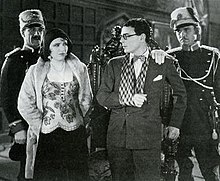| A Royal Romance | |
|---|---|
 Pauline Starke and William Collier | |
| Directed by | Erle C. Kenton |
| Written by | Norman Houston |
| Produced by | Harry Cohn |
| Starring | William Collier Pauline Starke Clarence Muse |
| Cinematography | Ted Tetzlaff |
| Edited by | Gene Havlick |
Production company | |
| Distributed by | Columbia Pictures |
Release date |
|
Running time | 66 minutes |
| Country | United States |
| Language | English |
A Royal Romance is a 1930 American Pre-Code romantic comedy film directed by Erle C. Kenton and starring William Collier, Pauline Starke and Clarence Muse. It was an unofficial remake of the 1925 silent film A Fool and His Money . [1]